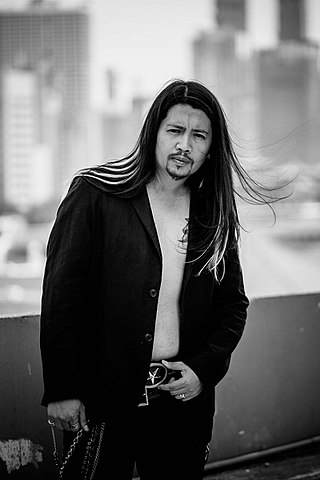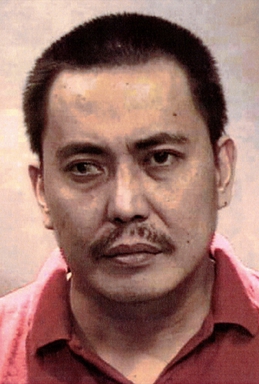
Capital punishment in Singapore is a legal penalty. Executions in Singapore are carried out by long drop hanging, and usually take place at dawn. Thirty-three offences—including murder, drug trafficking, terrorism, use of firearms and kidnapping—warrant the death penalty under Singapore law.
Woo Bih Li is a Singaporean lawyer who has been serving as a judge of the Supreme Court of Singapore since 2003.
Lawrence Ang Boon Kong is a Singaporean lawyer who specialises in corporate offences and criminal law.
Choo Han Teck is a Singaporean judge of the Supreme Court. He was formerly a lawyer before his appointment to the court as a judge. It was revealed in 2021 that Choo was one of the defence lawyers representing Adrian Lim, the infamous Toa Payoh child killer who was executed in 1988 for charges of murdering a girl and boy as ritual sacrifices. In 1994, Choo also defended Phua Soy Boon, a jobless Singaporean who was hanged in 1995 for killing a moneylender.

Huang Na was an eight-year-old Chinese national residing in Pasir Panjang, Singapore, who disappeared on 10 October 2004. Her mother, the police and the community conducted a three-week-long nationwide search for her. After her body was found, many Singaporeans attended her wake and funeral, giving bai jin and gifts. In a high-profile 14-day trial, Malaysian-born Took Leng How, a vegetable packer at the wholesale centre, was found guilty of murdering her and hanged after an appeal and a request for presidential clemency failed.

Josephus Tan Joon Liang, better known as Josephus Tan, is a Singaporean criminal defence lawyer.In 2015, Tan received the Singapore Youth Award.
On 6 June 1994, two Japanese tourists were robbed and attacked by two men in their shared room in the Oriental Hotel in Singapore. One of them was brutally assaulted and died, while the other survived. The case, known as the Oriental Hotel murder, was classified as murder by the police. The perpetrators were eventually caught 2 years later and they were subsequently sentenced to serve lengthy jail terms with caning for their part in the robbery and assault of the two tourists, as well as for unrelated offences committed before their arrests.
The President's Pleasure (TPP) in Singapore was a practice of indefinite imprisonment formerly applied to offenders who were convicted of capital offences but were below the age of 18 at the time of their crimes. Such offenders were not sentenced to death in accordance with the death penalty laws in Singapore; they were instead indefinitely detained by order of the President of Singapore. This is similarly practised contemporarily for offenders who were of unsound mind when they committed their crimes, who are thus indefinitely detained at prisons or medical facilities in Singapore.
Mathavakannan Kalimuthu is a Singaporean who, together with his two friends, assaulted and murdered a gangster named Saravanan Michael Ramalingam on 26 May 1996. Mathavakannan, who was arrested on 4 July 1996, was tried and convicted of murder by the High Court of Singapore. As murder was a hanging offence in Singapore and since he was 16 days past his 18th birthday when he committed murder, Mathavakannan was sentenced to suffer the mandatory sentence of death on 27 November of the same year he killed Saravanan. Mathavakannan's two accomplices were also found guilty and sentenced to death in the same trial.

Tan Chor Jin, also known by his alias Tony Kia, was a Singaporean gang leader known for fatally shooting 41-year-old Lim Hock Soon, his former friend and nightclub owner, using a semi-automatic Beretta 0.22 calibre pistol on 15 February 2006. Tan, who had underworld affiliations and was a member of Ang Soon Tong since his early years, had also robbed the Lim family of their valuables before he escaped Singapore to Malaysia, where he was arrested ten days later. The media gave him the name "One-eyed Dragon" given that he was blind in the right eye.

The Kallang River body parts murder was a murder and dismemberment case that occurred in Singapore in June 2005. The case earned its name due to the body parts of the victim, 22-year-old Liu Hong Mei, being found disposed off in Kallang River. In this case, Liu's 50-year-old supervisor, Leong Siew Chor, used a towel to strangle her to death, and severed her body into seven pieces - mainly her head, upper torso, lower torso, legs and feet - before disposing them off in Kallang River and other locations in Singapore.
Ramapiram Kannickaisparry, also known as Ramipiram Kannickaisparry, was an Indian-born Singaporean woman who was found dead in a forested area of Sembawang on 17 April 1995. Ramapiram was last seen alive six hours before her corpse was discovered, with thirteen stab wounds on her head and neck, and her body showed signs of being run over by a vehicle. The police classified the case of her death as murder, and three days later, a 40-year-old man named Nadasan Chandra Secharan, who was the younger brother of Ramapiram's brother-in-law, was arrested and charged with her murder. Investigations and court proceedings revealed that Ramapiram and Nadasan were engaged in an illicit love affair with each other, even though both were married to different spouses and had children.

Life imprisonment is a legal penalty in Singapore. This sentence is applicable for more than forty offences under Singapore law, such as culpable homicide not amounting to murder, attempted murder, kidnapping by ransom, criminal breach of trust by a public servant, voluntarily causing grievous hurt with dangerous weapons, and trafficking of firearms, in addition to caning or a fine for certain offences that warrant life imprisonment.
On 20 September 1981, Kalingam Mariappan, a 45-year-old boilerman, was last seen entering a lorry with two men, after the three of them had had drinks, and by a third man at the coffee shop. He was missing for two days before his wife reported him missing. The two men last seen with Kalingam were eventually brought in for questioning by the police, and one of them admitted that Kalingam was dead and they were responsible for assaulting him and setting his body on fire. Kalingam's body was later found at the East Coast Parkway, and the two suspects – 22-year-old lorry driver Ramu Annadavascan and 16-year-old news vendor Rathakrishnan Ramasamy – were both charged with murder. Eventually the trial court sentenced Ramu to death for murder while the other, Rathakrishnan, was imprisoned indefinitely under the President's Pleasure since he was still underaged when he killed Kalingam. Rathakrishnan is presently released since 2001, while Ramu was hanged on 19 September 1986 after losing his appeals against his conviction and sentence.
On 28 June 2008, 25-year-old Wu Yun Yun, a Chinese national and wife of opposition politician Tan Lead Shake, used a fruit knife to stab both her brother-in-law and sister-in-law. The brother-in-law, who was Tan's 33-year-old brother Tan Lead Sane, died after he sustained several knife wounds on his chest and abdomen, while the sister-in-law Huang Mei Zhe, who was Tan Lead Sane's wife, survived the stabbing. Wu, who was said to have committed the stabbing due to mistreatment from her in-laws and jealousy towards the supposed better life of Tan and Huang, was charged with murder and attempted murder. Eventually, in November 2008, the charges were reduced to manslaughter and attempted manslaughter due to Wu suffering from depression at the time of the murder. Six months after she pleaded guilty, Wu was sentenced to 16 years in prison on 17 November 2009.
Pan Hui was a 15-year-old girl who was found dead on 20 October 2007 inside a rental flat in Marsiling, Singapore. 45-year-old bus driver Ong Pang Siew, Pan Hui's step-father, was charged with murder. It was revealed in court that after the divorce, Ong and Pan's biological mother had been arguing regarding Ong's need to visit his biological son. On the date of the killing, Ong went there to see his son and his conversation with Pan eventually escalated into an argument that led to the strangulation.

On 1 July 2007, 29-year-old Manap Sarlip was found murdered outside his flat at Whampoa, Singapore. The police investigations led to the arrest of the killer, 17-year-old Muhammad Nasir Abdul Aziz, and Manap's 24-year-old wife Aniza Essa, who ordered and manipulated Nasir to kill Manap. Both of them were charged with murder and abetment of murder respectively. It was revealed that Aniza, who was in an unhappy marriage with Manap due to his abusive behaviour, had an affair with Nasir, who fell deeply in love with her and therefore, Aniza instigated Nasir to help kill her husband under the pretext that they would end up together without Manap. Subsequently, as a result of depression, Aniza was sentenced to jail for nine years after pleading guilty to manslaughter. As for Nasir, he was found guilty of murder but was imprisoned indefinitely under the President's Pleasure since his age of 17 allowed him to escape the death penalty for murdering Manap.
On 16 October 1972, 21-year-old Chelliah Silvanathan, alias Tampines Rajah, attacked and stabbed another man Arumugam Jayamani, alias Beatles Rajah, outside a sarabat stall in Enggor Street, Tanjong Pagar, and as a result of the stabbing, Arumugam died and Chelliah was charged with murder. It was revealed that Chelliah had stabbed Arumugam over a supposed gambling affair; both Chelliah and Arumugam belonged to the same gang society known as Hai Lok San. Chelliah was found guilty of murdering Arumugam and sentenced to hang on 21 September 1973. After losing his appeals against the sentence and conviction, Chelliah was hanged on 11 April 1975.
On 7 July 2008, at Ang Mo Kio West Garden in Singapore, 22-year-old movement operator Pathip Selvan Sugumaran murdered his 18-year-old girlfriend and kindergarten teacher Jeevitha Panippan, who sustained 15 bodily injuries during the stabbing, and three of the wounds led to Jeevitha's death. Pathip was arrested and charged with murder.

On 25 April 2006, at a playground in Ang Mo Kio, Singapore, 26-year-old Jagagevan Jayaram brought along a chopper and wanted to seek revenge on 26-year-old Sadayan Ajmeershah over a previous dispute, but it ended with Jagagevan being killed by Sadayan and his two friends who retaliated against Jagagevan's attack. Sadayan and his two friends, Arull Wanan Thangarasu and Melvin Mathenkumar Segaram, were all arrested and charged with murder; Arull was the brother-in-law of the victim. Ultimately, the charges of murder against the trio were reduced: both Melvin and Arull were convicted of causing hurt with dangerous weapons and each of them were jailed for four years with caning, while Sadayan was convicted of the most serious charge of manslaughter, and sentenced to nine years' jail and 12 strokes of the cane despite the prosecution's urgings for the maximum sentence of life imprisonment in Sadayan's case.








